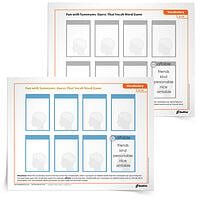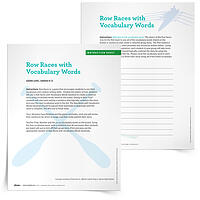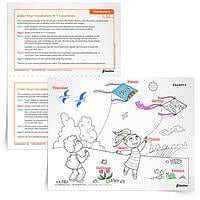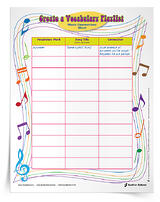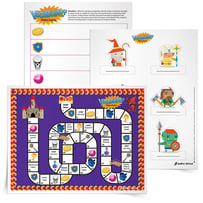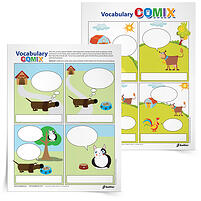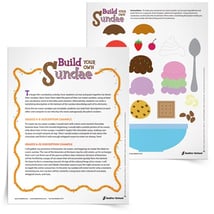January 5, 2018 VG Teaching Strategies Pro Dev Resources, Vocab Gal, ELA K-5, ELA 6-8, ELA Resources - Assessment, ELA Resources - Activities, ELA 9-12, ELA PD - Classroom Management, ELA PD - Vocabulary, ELA Resources - Games, ELA Focus - Vocabulary
Meaningful Vocabulary Instruction and How to Get the Words to Stick!
By: Vocab Gal
Quality vocabulary instruction is a goal for all teachers at the beginning of the school year, but it can quickly become lost in the midst of all the other instruction and assessment requirements that a teacher needs to meet as the year goes on.

Given that, how do you make vocabulary instruction meaningful and long-lasting for students?
Ultimately, meaningful vocabulary instruction all boils down to three words: integrate, reiterate, and relevant. When you integrate vocabulary throughout your entire period or school day, reiterate words often, and show their relevance to students, students want to learn new words!
Here are my top five methods of teaching vocabulary that I use all year long.
TOP 5 METHODS OF TEACHING VOCABULARY
#1 DAILY ROUTINE
I have a post specifically about integrating vocabulary instruction into your daily routine, but essentially, if you want to make vocabulary meaningful, you need to make vocabulary instruction and/or review a part of your daily classroom routine.
Whether it’s vocabulary instruction using two words each day, or vocabulary instruction with ten words the first day and review the rest of the week, the goal is to show students that vocabulary learning is an integral part of classroom learning.
Additionally, when providing daily vocabulary instruction and/or review, be sure that students have an opportunity to understand and use vocabulary words in ways that are relevant to their lives. Using a vocabulary word in a sentence about a WWII General is not an effective example for students. Meaningful vocabulary instruction starts with enfolding vocabulary words into the lives of our students. Model using vocabulary words in conversation and writing by discussing topics and trends that are relevant to your class.
Also, integrating vocabulary into your instructions to and conversations with students also makes for a lively and vocabulary-centric classroom.
#2 MEANINGFUL ASSESSMENTS
I can’t stand it when teachers give students weekly vocabulary quizzes with fill-in-the-blank sentences or multiple-choice answers!
While this may be necessary during semester or final exams, a (bi)weekly vocabulary quiz works best when students use the vocabulary words authentically. As an alternative to the "traditional" vocabulary quiz, early in my teaching career I started using vocabulary assessments that allow me to see the depth of each students' vocabulary knowledge.
To support meaningful vocabulary assessments in my classroom I created the Differentiated Weekly Vocabulary Assessment Handout.
Here's how it works:
Of the ten vocabulary words we learn each week, I select five of the vocabulary words at random (I vary the words from class to class) and write them on the board. I then select (again, at random and it varies from class to class), a “blast from the past” word from a previous unit, so that students are always studying the previous unit’s vocabulary words.
Students copy the words from the board onto their Differentiated Weekly Vocabulary Assessment Handout and follow the instructions to complete the quiz. Students must use each vocabulary word in a sentence that shows they know what the word means and how to use it correctly. They must underline the context clues used to demonstrate their knowledge of each word and circle the word itself.
Whether students write their own sentences about a topic of their choice or write about the texts they are studying, having students write with the words means that the vocabulary should be used, not just memorized.
Meaningful assessments also show that vocabulary is relevant to students’ lives and to their other learning.
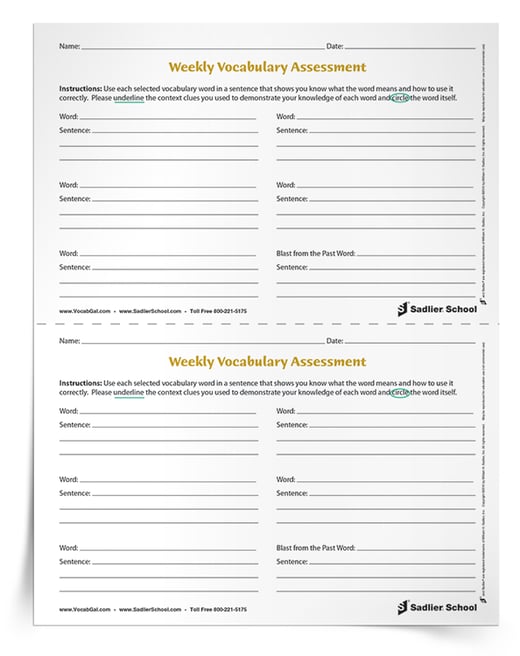
#3 CONSTANT REVIEW
It is imperative that previous weeks’ vocabulary words be reviewed and used. Whether students have to use vocabulary words in all assessments or simply know that “blast from the past” words will be included on a current vocabulary quiz, the more often students review and use all of their vocabulary words, the more solidly they will learn them.
Ultimately, these words will be then retained because they have been reiterated so many times.
The easiest way to review new and past vocabulary words is with vocabulary games. Periodically, I set up centers of vocabulary games and have students rotate through the stations to review past words.
To check out some of my favorite review games, click here.
#4 MAKE VOCABULARY INSTRUCTION FUN
One of my pet peeves is when students perceive vocabulary as nothing more than a set of arbitrary words for them to memorize, rather than a group of exciting words with which to play!
Rather than confine my students to workbook drills, I provide them with a wide range of vocabulary games and vocabulary activities to help them apply their words in fun, creative, and relevant ways.
These vocabulary games and activities can be used whenever you have a few free moments, on the crazy days when you need something fun but still meaningful to do, or as a part of your daily routine (see Tip #5). Furthermore, you can both integrate these vocabulary games and instruction into other classroom learning and require students to reiterate words multiple times in each activity. Playing games and doing fun activities certainly helps make vocabulary more relevant to students than simply doing exercises with words in a workbook.
#5 CELEBRATE SUCCESS
I ask my students to find and use vocabulary all of the time. When they do so, I like to celebrate—by often simply saying “thank you for using vocabulary” and/or giving out tiny stickers and other awards.
As a result, my students are integrating words into other conversations, reiterating them often, and seeing their relevance in their own speech and writing.
I see former students who still take pride in using vocabulary words they learned in my class and have current students who can’t wait to tell me about the words they’ve found outside of class. I integrate vocabulary into my daily routine, we reiterate words constantly, and look for ways to make vocabulary relevant.
FYI: I do NOT provide extra credit for my students, as the love and use of vocabulary should be its own reward, and when students use the words they are studying, they do better in general on their assessments and ultimately become better readers and writers.
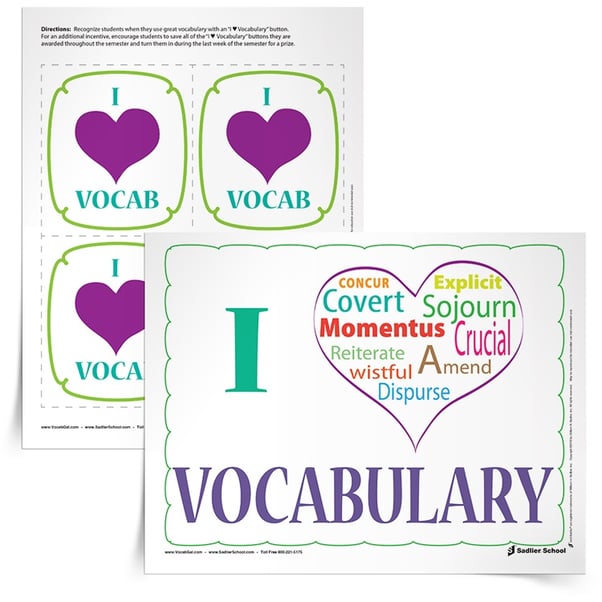
IN CONCLUSION
Meaningful vocabulary instruction all boils down to three words: integrate, reiterate, and relevant.
My simple methods for teaching vocabulary and making vocabulary instruction meaningful is a solid foundation on which educators can build. Educators will find that the lexicons of their students will increase significantly if they focus on integrating words into daily routines, creating meaningful assessments, reviewing vocabulary words often, making instruction fun, and celebrating students' success.
Ultimately, even the most basic methods for teaching vocabulary will be effective if we educators emphasize integration, reiteration, and relevancy!
RELATED RESOURCES:
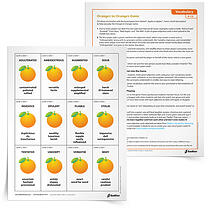
|
|
|
|
|
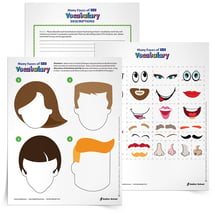
|
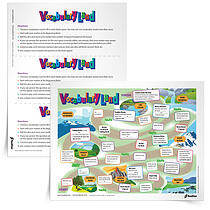 |
|
|
|
|
|
|
|
|






